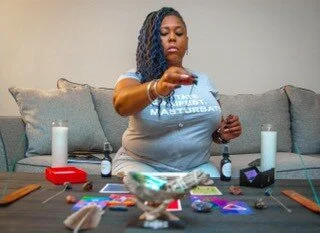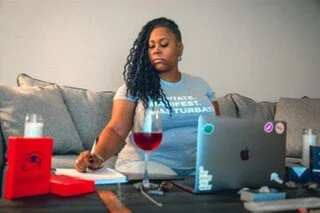Nurturing our Cycles Through Ritual
Meet ShaVaughh Elle, a creative healer and creator of Say It With Sex who is helping people understand how sex and spirituality are synchronized. ShaVaughn’s efforts are guided towards helping people of color and those who identify as feminine to connect with themselves better and redefine sexual liberation. My Sex Bio had the chance to talk to ShaVaugh about how we can nurture our sexual selves and connect with our menstrual cycles.
MSB: You mention in your biography that you are on a mission to unpack our distorted sexual lens. Can you explain what that distortion is and why it exists? How can we start to unpack it so that we can connect more truthfully to our sexuality?
SE: A distorted sexual lens is rooted in patriarchal views, weaponized spirituality and religion, respectability politics, and anything separate from what your soul calls you to express. Distorted views of sexuality exist, specifically for those who operate in their feminine energy. This is because some try to suppress the feminine energy in others, seeing it as something to be contained and restricted; that women, femmes and those on the spectrum should remain in a palatable box that’s easily digestible for others who are afraid of their sexual energy and expressions.
The way to begin to unpack this is to acknowledge your expressions are being suppressed. To acknowledge the many times you’ve allowed people to quiet you or shame you or even impress their own views upon you as if you’re designed to live life as a carbon copy of others. The way to connect more truthfully and authentically to our sexuality is to accept every facet of what this means for us, even the parts that aren’t favorable or liked. We often seek likability from others in our sexual expression; when really, we are the only ones who need to like it because our sexual expressions and sexuality are unique to us.
It’s not a collective journey, though we are bound to meet like minds along the way.
MSB: Do you know any wellness or self-care rituals that can help people connect to their natural menstrual cycles?
SE: I have stage 4 endometriosis and PCOS, so I’ve had a tough time with my menstrual cycle. Things I’ve learned along the way are to have a better relationship with my body. This meant tracking my cycle and ovulation times, eating things to support a healthy cycle, disconnecting from outside stressors that may affect how my body detoxes itself, as well as allowing my emotions to express themselves as they are since our hormones are heightened during this time.
I use organic products. Honey Pot Co is my go-to, including teas with raspberry leaf and cinnamon to assist with inflammation and just overall, feel-good vibes, and I let myself have that pint of ice cream. No, it isn’t always the best thing to have during your cycle because of the sugar content, but it’s what I want, and I don’t deny myself the things that soothe me during this time.
Also, I recognize that I’m most sensitive and intuitive during this time and honor my natural ability to attune to the atmosphere around me. Connecting to your body during your menses is so important because we all have our “period” differently. If you know you experience cramping and tension, start that cinnamon tea early. Get a CBD regimen going. Greek yogurt is excellent to assist with cramping and bloating. Increase your iron intake with beets, fish, and green, leafy veggies. Add an iron supplement if you bleed heavy.
Preparing your body is key to having a happy and healthy period.
MSB: Do you see these cycles being experienced by people without vulvas?
SE: Yes. Again, I have stage 4 endo and because of this, my cycle often skips a month. So while I don’t always experience the tangible effects of a cycle, I go through PMS symptoms. In place of this, I absolutely believe non-vulva owners experience their version of a “cycle.” We see men, those on the spectrum, non-binary, and the like, experience an up and down flow of emotion. It may not come every 21–28 days, but my cycle doesn’t come every 21–28 days, so does that mean I don’t have a formal menstrual cycle?
Our bodies naturally detox in various ways, if we pay attention. And while physical blood may not expel from everyone, the broader perspective of a “cycle” does exist for vulva and non-vulva owners.
MSB: Why do you believe it is so important to nurture our sexual selves? And how do you do it?
SE: I believe we can nurture our sexual self, and we must acknowledge the expression of sex exists within us. There’s been much condensing and rearranging, so first, we must uncover how sex wants to speak through us and then give it care. To nurture is to show grace and care. We start by forgiving ourselves for putting a muzzle on our sexual expression. That, in itself, takes time because so many things will activate those feelings of restriction.
Though social media can be restrictive in many ways, it’s also a great place to explore without putting yourself out there before you’re ready. Research is helpful.
Some books to look into are:
The Body is Not an Apology — Sonya Renee Taylor
Becoming Cliterate — Dr. Laurie Mintz
Queer Sex — Juno Roche
Women Who Run With the Wolves — Clarissa Pinkola Estes, Ph.D.
Unf*ck Your Intimacy — Faith G. Harper, Ph.D.
Pleasure Activism — Adrienne Maree Brown


